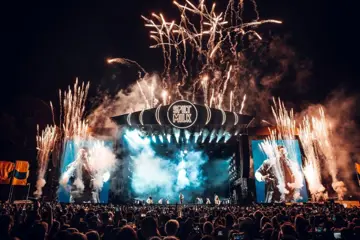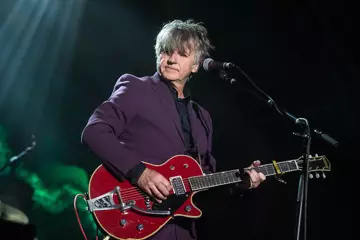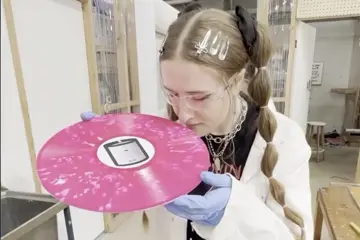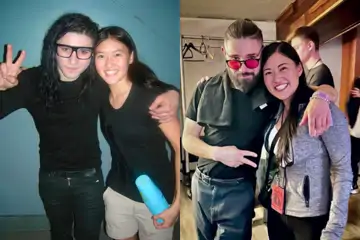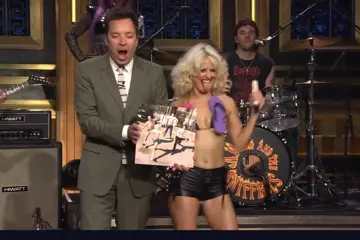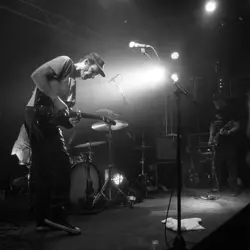 Oblivians
ObliviansMemphis garage-punk trio the Oblivians are not a band who pay much heed to convention. The three members alternate between vocals, guitar and drums both onstage and in the studio – no bass guitar required – and favour recording quickly and on the cheap, yet their ragged, blues-tinged take on rock’n’roll remains weirdly compelling.
Their initial ‘90s tenure was fast and furious – lasting as it did between 1993 and 1998 – but post-split their legend in the underground scene escalated to the point where they began playing sporadic reunion shows – just small hometown affairs – which were so well-received that it morphed into a full-blown reunion in 2012, in turn prompting their first-ever Australian visit. It’s quite remarkable that a band with such local ambitions and such an ad hoc foundation ended up becoming so influential on the world scene (albeit in a small guitar niche), but that ‘s just what transpired.
“We were originally thinking that we should get a drummer, because I originally played bass for years but didn’t have a bass at the time, just a guitar,” Jack Yarber recalls of the Oblivians’ origins. “It had to be the right person, someone who fit in head-wise. This was right when grunge hit so a lot of the drummers were coming off of a Red Hot Chili Peppers-style band and going into a Nine Inch Nails-style groove, which is where it’s at if you’re trying to get a record deal and make it big, but we just needed somebody who can play pretty good and not try to overpower us with a different style of music.
“While doing that, we just traded roles with a floor tom and a snare with one cymbal – that’s why the first album, Soul Food (1995), has no bass drum. I think we had a tambourine taped to the floor tom. But that record was done just so we could get some 7"s – it wasn’t like, ‘Let’s make an album’ – so we just went into a nice studio where we knew the engineer, who was a cool dude who recorded all types of bands and could put up with any kind of noise. We didn’t have any money, so we said, ‘We just need two or three hours,' and just went in and soundchecked a song two or three times and then we’d just record it. Then we’d listen to it and just check that the levels were balanced with the volume of the drums and the two guitars and vocals, and if we got it balanced we’d go in and record a whole live set like it was a gig – maybe we’d repeat a certain song once or twice. We thought that way that we’d get a 7" – or maybe if we were lucky two 7"s – and we could do it ourselves like that. Eric [Friedl – Oblivians member]’s first 7" release on [his indie label] Goner [Records] was Oblivians from that session.
Don't miss a beat with our FREE daily newsletter
"Soul Food is like the idea of a band but not the full band – no bass player and no bass drum – so it’s just a blare. So we worked in the bass drum, so by the time the next album Popular Favorites (1996) came out we had a proper sound. If you had a new person coming to the band and they said, ‘I’ve never heard the Oblivians, what should I listen to?’, I’d point them in the direction of Popular Favorites first; at least it might be vaguely similar to something that they’d heard before. After playing for a while together with just the three of us, we were still thinking about whether we should get a drummer, but after we’d recorded and done a few records and they’d come back and it sounded good on the record – you don’t need a bass guitar as long as you get a good performance – it stopped sounding like there was anything missing, we’d just get one of the guitars tuned kinda bass-y.”“But somewhere in there Tim Warren at [German-based indie label] Crypt Records wanted to do a 7", so we gave him 10 or 12 songs to choose from and he liked so many that he asked if we wanted to do an album – he was faxing us back and forth, as you did at the time – and then maybe a month after that he asked is we wanted to do a tour of Europe when the album came out, and we were, like, ‘Sure! That’s weird’, and then by the time we went to Europe – somewhere in that period between recording what would become the album and going to Europe – somewhere in there we brought in the bass drum, so you could actually sit down and play with your foot. Proper drumming is I think what it’s called.
Even as the Oblivians' unique set-up was forming, it didn’t always go quite exactly to plan.
“Even when we added the bass drum, Eric wouldn’t do the bass drum; he preferred the old Soul Food-style where he’d play standing up but he only drummed on a few tunes anyway,” Yarber recalls. “But when we added that bass drum we felt, ‘Oh, this is gonna be our next big move in the record industry’ – it shoulda been written up in Billboard or something; Oblivians add bass drum to band! Then we had to buy a drum stool as well – I knew there would be a catch, we had to buy two things. But I’d played drums before and Greg had too – we knew enough to fuck around a bit – so it was just a matter of working with the sound we had going.
Even now, we still wreak havoc with sound guys ... we start moving the mics around and moving the drums around and they’re like, ‘Oh god, what is happening?'
“So that original idea of us all playing and switching instruments was just us going, ‘I’ve got a song’ and the other guy would go, ‘I’ve got one too’ and we’d all swap – it was just us hanging out, like we were camping and passing the guitar around and taking turns and that kinda thing. Then playing a gig it became, like, ‘Oh yeah, I play drums on this song’, or ‘I play electric guitar on this one’, and Greg being left-handed he has to switch the drums around, which made it more time-consuming. Plus things would get tangled up in leads when we were moving drums and mics would be falling over and some sound guy would be, like, ‘What’s going on up there?’ and we’d have to calm them down.
"Even now, we still wreak havoc with sound guys, they’re just not used to bands with no bass guitar – the first thing they usually try to do is boost the bass in the mix which doesn’t help because it’s supposed to sound like what we’re doing already – and then we start moving the mics around and moving the drums around and they’re like, ‘Oh god, what is happening?’ Meanwhile the Oblivians fans are there yelling and it’s mayhem. Fun mayhem.”
This ad hoc approach worked so well that they’ve embraced it wholeheartedly, never even bothering with actual set lists for shows.
“We aren’t one of those bands where it’s all laid out like a show, like Cats – although I haven’t seen Cats so I’m just guessing – and the same thing happens every night,” Yarber chuckles. “We do the same songs but we don’t do them in the same order, we don’t have a set list; we just know that I’m going to be playing drums first and then Greg comes in and plays a little bit and then I’ll come back and play a little bit and then we stop and maybe we’ll play some more.
"We have tried some gigs where we start with Greg on drums first and then me on guitar, but it just doesn’t work – my nerves are too shot, I’d rather play drums first. Sometimes we’ll just get a piece of paper and write our three names at the top – Jack, Eric and Greg – and then below that we’ll write all of the songs that we’ve been doing currently that we can think of, and some of them we haven’t been doing much. Then we’ll forget some of them, and someone from the crowd will yell one out we’ve forgotten and we’ll go, ‘Oh yeah, let’s do that one’– that’s just us.
“If we tried to make it like a Cats travelling rock-package show I’m sure it would be terrible. Maybe imposing structure on us would be good, but I’m pretty sure it would be terrible. I guess punk is supposed to be about abandoning the formula, but we’re not just punk, we do blues and techno or whatever – not that it always sounds like punk or techno. I’m trying to work out why people dig it too, but I figure as long as we keep playing songs like Love Killed My Brain they’ll stick with us, because everyone can relate to that. For a little three-piece band with no bass player and no idea of what songs they’re going to play on any given night until it happens we do surprisingly all right.”
As far as trying to do a blues song like Lightning Hopkins or whatever and sitting down and trying to play it exactly the same way as him or you’re in your early twenties and trying to sing like an older black man, we didn’t really approach it that way.
And given that the Oblivians are highly synonymous with their native Memphis – one of the most musically inclined cities on the planet – is it fair to assume that the city’s melting-pot approach to musical styles has played a role in the Oblivians’ sound over the journey?
“I think we listen to all kinds of music – it’s not like we were going to play just punk,” Yarber reflects. “Back in the days when we were travelling in the van – and most bands do this, they all like the same thing and listen to, say, soul music in the van, but then get out and do the show and be playing heavy metal or something – but we’d listen to all kinds of things, but as far as trying to do a blues song like Lightnin' Hopkins or whatever and sitting down and trying to play it exactly the same way as him or you’re in your early twenties and trying to sing like an older black man, we didn’t really approach it that way. We’d just take the primal element or the feelings and put that into an Oblivians song instead.
“We had a few bluesy things – Greg had a few; Hey Mama, Look At Sis [from Popular Songs] was a bluesy number and the record that he took the riff from was a slow old number, and he just made his own song out of it. As an analogy, it’s like you’re a record store nerd who likes all kinds of music and just blending it and not really trying to make a direct cover of someone else’s style, just taking an element of it and mixing it with something else. Sometimes it might not work out. Thinking back now, maybe an early thing that showed us how this could be done was The Gories’ version of the Suicide song Rocket USA – which is just a sad little song with a drum machine originally – but they just do it their own way and it sounds good. It’s not trying to sound like the original recording, they’re just doing their own thing with it. A big Suicide fan might say, ‘Well that version’s cool, but the Suicide version is the best’, but that’s not the point – they’re not trying to top it, they just dig it and it inspires them. So if it’s something we really dig, we just try and do it in our own way.”




